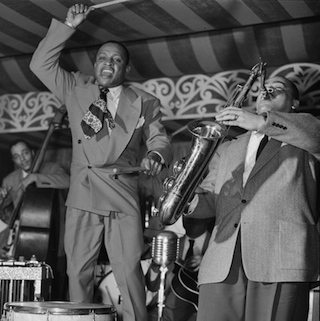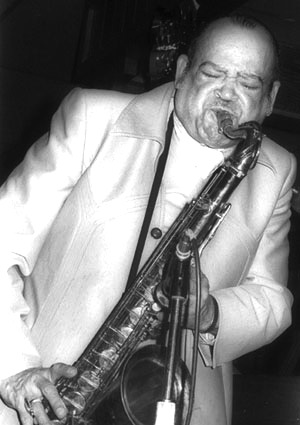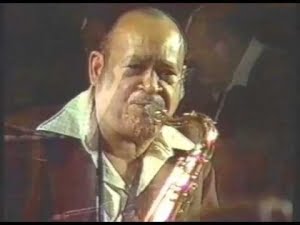10.08. – Happy Birthday !!! Arnett Cobb (tenor saxophonist) was born on 1918 in Houston, Texas and passed away on March 24, 1989 in Houston at the age of 70.
He was taught piano by his grandmother and went on to study violin before taking up tenor saxophone in the Wheatley High School band. When he was fifteen he joined Louisiana band leader Frank Davis’s band and performed in the Houston area and throughout Louisiana during the summer. He worked with trumpeter Chester Boone for two years and left to become a founding member of the Milton Larkin Orchestra in 1936.
Cobb worked with Larkin for six years and, with members Eddie Vinson, Cedric Haywood, Wild Bill Davis, Illinois Jacquet, and others, made the band one of the most successful territorial bands from Texas. The band became a regular at venues including the Apollo Theatre in Harlem and boxer Joe Louis’s Rhumboogie Club in Chicago.

Originator of the “open prairie” tone and “southern preacher” style, Cobb continually turned down offers from many national bands including Jimmy Lunceford, Count Basie, and Lionel Hampton. However, with his mother’s approval, and Gladys Hampton’s offer to Elizabeth (Cobb’s wife), in 1942 Arnett took the lead saxophone chair in Hampton’s band, replacing Illinois Jacquet, who had gotten the position as Arnett’s substitute (from an original 1941 offer to Cobb). Jacquet had held his position with Hampton on the condition that he switch from alto to tenor and “play like Cobb.” With Cobb as the featured soloist, Hampton re- recorded his theme song, “Flying Home [No. 2]. He was a major asset to the Hampton band for five years as co- writer, writer, reed-section arranger, lead saxophone, featured soloist, and talent scout. Gladys Hampton and Elizabeth Cobb helped manage the band, and Cobb’s mother did the tailoring.
Cobb left Hampton in 1947, formed his own combo, and was immediately signed by Ben Bartz of Universal Attractions for management and booking. Under Ben’s direction, Cobb toured extensively through 1949, while recording such hits as “Dutch Kitchen Bounce” ( Princeton University’s theme song), “Big Red’s Groove,” “Go Red Go,” and “Big League Blues” for the Apollo label. He had begun some of his most influential years in American music history with his showmanship (bar walking and circular breathing techniques) and style (predecessor of Texas “swing” blues).

Between 1950 and 1956, Cobb produced a string of hits including “Jumpin’ the Blues,” “Lil Sonny,” “The Shy One,” and “Smooth Sailing” (Ella Fitzgerald’s signature scat) on the Columbia label; “Night,” “Light Like That” and “Flying Home Mambo” on the Atlantic label; and other popular tunes for these and other labels. His combos and support became a career-building platform for Red Garland (playing with Miles Davis), George Rhodes (Sammy Davis Jr.’s music director), George Duvivier (bassist), Dinah Washington, comedian Redd Foxx, Jackie Wilson, Arthur Prysock, and many others. Arnett scouted James Brown, positioned him as his opening act, and took him to New York to sign with agent Ben Bartz at Universal.
In 1956 a car accident interrupted his national prominence. Against doctors’ advice, a year later he was back performing and touring coast to coast, although from this time on he could not walk without crutches. Cobb was living in New Jersey at the time, but the long, cold, damp, northeastern winter made working too strenuous, so in 1959 he moved back to Houston permanently. He managed the Club Ebony, organized regional orchestras for touring acts (Sammy Davis, Sarah Vaughn, Ella Fitzgerald, Ray Charles and others), and devoted a lot of time to nurturing young talent. Major recording R&B, soul, and jazz artists of the day called on him constantly for arrangements, band personnel, and gigs.
Cobb restricted his touring to Texas from 1959 to 1973, but proceeded with a recording schedule that had continued from 1957 for the Prestige label. He recorded extensively with VeeJay, Prestige, Muse, Black and Blue, BeeHive, Progressive, Soul Note, MCA, and the Fantasy labels between 1957 and 1988. Cobb began an international touring schedule in 1973 with his daughter as his personal manager. He toured consistently, in the U.S., Europe, and Japan, with the Lionel Hampton All-stars, as a member of the renowned Texas Tenors, as a featured soloist, and, from 1985 to 1989, with his own ensemble, Texas Jazz and Blues featuring Jewel Brown.
Cobb was a prolific showman, writer, stylist, arranger, and tenor saxophone technician. His saxophone technique and music style directly influenced Illinois Jacquet, Gene Ammons, Johnny Griffin, Red Prysock, Houston Person, Sonny Stitt, Stanley Turrentine, King Curtis, Eddie “Lockjaw” Davis, Rahsaan Roland Kirk, and a generation of musicians in jazz, swing, R&B, soul, and funk music.
Cobb received a Grammy nomination in 1979 for best jazz instrumental performance “Live at Sandy’s,” (Muse). He shared a Grammy with B. B. King in 1984 for best traditional blues performance “Blues n’ Jazz,” MCA. In 1986 he founded the Jazz Heritage Society of Texas, which established the Texas Jazz Archives at the Houston Public Library.
Cobb once stated, “I never got into bebop or any of those other styles,” he said. “I think you should stick with what you do best, no matter what line of work you’re in.”
Arnett Cobb died in Houston on March 24, 1989, and was survived by his daughter.






More Stories
CD review: George Benson – Dreams Do Come True: When George Benson Meets Robert Farnon – 2024: Video, CD cover
The band was tight as ever. The Warren Haynes Band cuts loose: Video, Photos
Interview with Alvin Queen: Feeling Good – I heard these tunes played by … Video, new CD cover, Photos